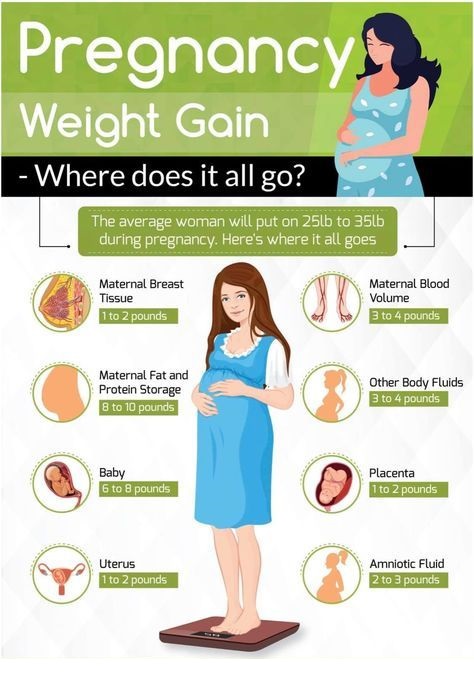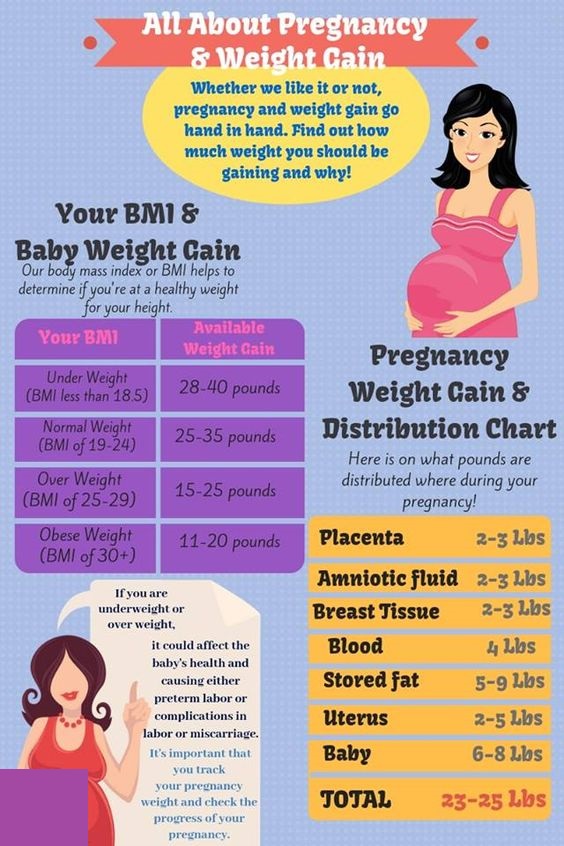Pregnancy can be a magical time, but the stress of how much weight you should gain trimester by trimester or even overall can leave you in a tizzy! If you don’t have the answers, it can be easy to go overboard with encouragement from well-meaning but sometimes ill-advised friends and family (think “eating for two”). So how much weight should you gain and how? Depending on your general health, your current weight, and other factors, this answer will vary. And as it turns out, much of America is getting it wrong. If it all seems too confusing, we can help clear things up for you.
Also Read: 11 Factors That Can Cause Bleeding During Pregnancy
Aim At A 25–35 Pound Gain Overall If Your BMI Is Normal
How much weight you need to gain primarily depends on the combination of your current pre-pregnancy body weight and height, as measured by your body mass index (BMI). You are considered normal weight if your BMI is 18.5–24.9, underweight if it is below 18.5, overweight if it is between 25–29.9, and obese if your BMI is 30 or over. Here are the guidelines to follow, as suggested by the Institute of Medicine:
- Normal-weight women should gain 25–35 pounds
- Underweight women should gain 28–40 pounds
- Overweight women should gain 15–25 pounds
- Obese women should gain 11–20 pounds
Of this 25–35 pounds you gain if you are of normal weight, about 6.5–7.5 pounds translate to your baby’s weight and 5–8 pounds come from added weight on your body in the form of fat to help with breastfeeding. The rest is from your uterus, breasts, placenta, amniotic fluid, and additional blood and fluids to support your pregnancy.
If you’re expecting twins, your weight gain needs will change as follows:
- Normal-weight women should gain 37–54 pounds
- Underweight women should gain 50–62 pounds
- Overweight women should gain 31–50 pounds
- Obese women should gain 25–42 pounds

Major Weight Gains Should Happen In The Second And Third Trimester
During your first trimester, you shouldn’t be gaining too much weight – as little as 1.1–4.4 pounds is fine. Aim at a steady and gradual weight gain during your second trimester. Something in the range of 0.5 pound to 1 pound a week is just right. You may go up and down from this a little, week to week. As long as it averages out, with no major dips or spikes you should be fine. This same steady pace of 0.5–1 pound gain every week needs to carry forward into the final trimester as well, as you prepare for the arrival of your little one.
And remember, eating right during pregnancy does not mean twice your normal intake or as per the wisdom of “eating for two.” To give you a sense of how much “extra food” you need to eat for your baby, consider these: If you are of normal weight, an extra whole grain tomato and cheese or peanut butter sandwich with a banana is about all you need extra for the whole day in energy value! If you are overweight or obese, all you need is two apples or a single slice of wholegrain bread more a day. And that’s only after week 12. Before that, your normal diet is enough if you are in good health otherwise.
Most Women Gain Too Little OR Too Much Weight, Only 32% Get It Right
Now you’ve seen the actual guidelines, here’s a look at just how wrong everyone seems to be going with their pregnancy-related weight gain. According to the Centers for Disease Control and Prevention (CDC), 47% of women gain more weight than they need to during pregnancy. But, on the other hand, about 21% of women fall short of the ideal range. A mere 32% manage to get their weight gain levels right.
Incorrect Weight Gain Can Be Unhealthy For You And Your Baby
Why is it crucial that you gain weight within this range during pregnancy? If your gestational weight gain is either below or above the recommended levels from the Institute of Medicine, it could cause health problems and other issues for you and your baby. You could wind up with a baby with low birth weight if you don’t gain enough weight – the risk is heightened when the mother doesn’t gain enough to supply the baby with all the right nutrients for growth.

Gain too much weight and you may be at risk of future obesity for yourself and childhood obesity for your baby. It may also cause issues during the pregnancy like water retention, gestational diabetes, hypertension, preeclampsia, and raised risk of needing a delivery by C-section. Your baby may wind up being born preterm, be much larger than average or normal, and could be at risk of congenital problems.
Put Steps In Place For Safe Pregnancy Weight Gain
Fit in daily exercise if you can, failing which at least get in 30 minutes 3–4 times a week. A brisk walk, swimming, or even cycling are perfect. Prenatal yoga will also keep you fit and stress-free. However, if you are at risk of preterm birth, please consult your doctor about gentler alternatives and check if you need to avoid any significant physical activity altogether.
According to the American College of Obstetricians and Gynecologists, a third of American women are obese. Over 50% of all pregnant women are either overweight or obese. This increases the risk of pregnancy complications, so weight gain needs to be managed carefully. The Committee on Obesity in Pregnancy has these suggestions to make:
- Get your height and weight recorded as soon as you find out you’re pregnant so you know your BMI and can keep a target weight gain in mind.
- Opt for nutritional consultation if your doctor suggests it, but ask if they don’t. This will help you make smarter food choices during your pregnancy.
- Follow an exercise regimen approved by your doctor to stay fit and prevent excessive weight gain.
- You may need to be checked for potential nutritional deficiencies and vitamins or supplements may be suggested.
- Speak to an anesthesiologist early on in labor because you are at greater risk of anesthesia-related complications when overweight.
If you are reading this before you get pregnant, try to lose as much weight as you can before trying to get pregnant.
If you are underweight, consulting your doctor and nutritionist is equally important to find a healthy way to gain weight. Research suggests that getting this professional advice on your diet can help you reduce the risk of preterm birth. You may be asked to include nutritious, calorie-dense foods like nuts and seeds or healthy fats like avocados in your daily diet. Healthy snacking may also be suggested frequently. Keeping a food diary can help ensure you get enough calories, nutrients, and even water daily.

Follow These Nutrition And Diet Tips During Pregnancy
Don’t skimp on essential nutrients in the name of keeping your weight under control. Eat a variety of fresh, organic foods and make sure you get enough of healthy fats as well.
Striking the right balance with mindful eating can make all the difference to how healthy your pregnancy weight gain is for you and your baby. Here are some things to keep in mind:
- Even if you are overweight or obese, never go on a low-calorie diet when pregnant.
- Aim at eating a healthy, balanced diet that gets in recommended levels of the various nutrients without being unhealthy.
- Avoid foods with empty calories like sugary sodas and candies that supply you with little to no nutrition.
- Cut down on carbohydrate intake if you are very overweight or have gestational diabetes as this can cause blood sugar levels to spike.
- Ensure you have enough fiber in your diet.
- Some women find it easier to manage their weight by having modestly sized main meals and a couple of mini meals or snacks of healthy things like yogurt or fruit or vegetable crudites and hummus during the day.
- Eat 4 servings of veggies and 2 servings of fruit daily.
- Don’t skip breakfast – try and keep it healthy with porridge or wholegrain toast, egg whites, and fresh fruit or vegetables.
Even if your weight is not a worry, you could consult a nutritionist to give you some suggestions and draw up an appropriate plan. This will ensure a safe diet plan during pregnancy which keeps you in the ideal pregnancy weight gain range for your BMI without your missing out on any essential nutrients
Read More Posts:
